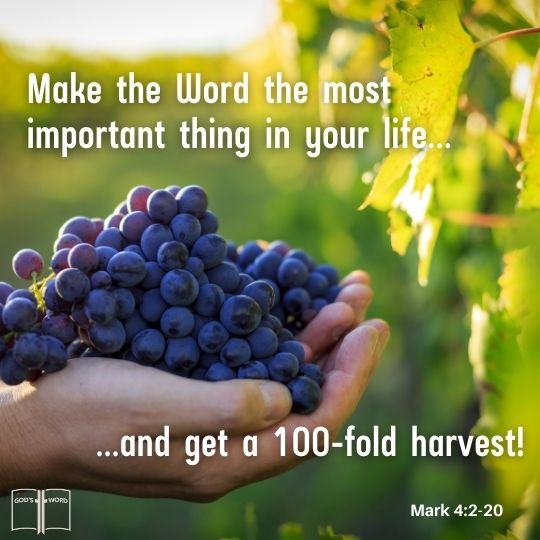- Home
- Bible Study
- Sower and the Seed
Parable of the Sower and the Seed: Its Meaning for Today
The Parable of the Sower and the Seed is found in several places in the Bible: Matthew 13:1-9; 18-23; Mark 4:2-20; and Luke 8:5-8; 11-15. Jesus taught this message of the kingdom of God to the multitudes that had gathered by the seaside.
Behold, there went out a sower to sow: And it came to pass, as he sowed, some fell by the way side, and the fowls of the air came and devoured it up. And some fell on stony ground, where it had not much earth; and immediately it sprang up, because it had no depth of earth: But when the sun was up, it was scorched; and because it had no root, it withered away. And some fell among thorns, and the thorns grew up, and choked it, and it yielded no fruit. And other fell on good ground, and did yield fruit that sprang up and increased; and brought forth, some thirty, and some sixty, and some an hundred, Mark 4:3-8.

Key Terms in Jesus' Parable:
- the sower – whoever broadcasts the seed
- the seed – the Word of God
- the ground (the soil) – people’s hearts
In Matthew 13:37, Jesus is identified as the sower of the good seed. By extension, we, who are born again and called the body of Christ, are also sowers who broadcast or share the good news, the Gospel.
The seed is the Word of God. It is incorruptible seed. 1 Peter 1:23 says: Being born again, not of corruptible seed, but of incorruptible (seed), by the word of God, which liveth and abideth for ever, (brackets mine).
The ground is our heart. It is the condition of heart that affects the viability of the seed sown. Jesus compared our hearts to four different types of soil: the hard ground (the wayside or path), the rocky ground with no depth of soil, the thorny ground, and the good ground with rich soil.
Main Message of the Parable of the Sower and the Seed
Jesus explained the importance of this parable to his disciples (and that includes us born-again ones) when they questioned its meaning and His use of parables.
He replied: Know ye not this parable? and how then will ye know all parables? Mark 4:13.
He went further, saying that to them had been given the knowledge of the secrets of the kingdom, Unto you it is given to know the mysteries of the kingdom of God, Luke 8:10. This is also recorded in Mark 4:11 and Matthew 13:11. Jesus then gave detailed explanations of the profound truths contained within this parable.
Side note: When Jesus referred to "them", He was talking to His disciples. If you've been born again, actually follow Christ, and are a student of His teachings, then you are His disciple and this applies to you as well :)
The First Type of Ground: The Hard Path
Jesus taught about the poor soil: When any one heareth the word of the kingdom, and understandeth it not, then cometh the wicked one, and catcheth away that which was sown in his heart. This is he which received seed by the way side, Matthew 13:19.
The wicked one, Satan, will steal this seed, the Word, from those who don't understand it.
This is key knowledge for us when we share God's Word with others. We need to do it with clarity and at a level that people can understand. Using religious words and theological terminology will only confuse people, and not bring salvation to them. Share the Gospel with simplicity.
Key Point: Share the Gospel with simplicity.
The Second Type of Ground: The Stony Ground
Jesus describes these as those with a stony heart: And these are they likewise which are sown on stony ground; who, when they have heard the word, immediately receive it with gladness; And have no root in themselves, and so endure but for a time: afterward, when affliction or persecution ariseth for the word's sake, immediately they are offended, Mark 4:16-17.
With joy, these people received the seed, the Word of God. It sounded wonderful, but they didn't take time to establish themselves in the truth of God's Word by studying the Scriptures and making the truth they heard a reality in their lives.

The affliction and persecution that comes to them is from Satan, who purposes to steal the Word from them.
This is a good reminder to us that we need to study and meditate on the Word so that it develops deep roots in our hearts. When affliction and persecution come (which they will), we know how to stand strong against them.
Key Point: Study and meditate the Word.
The Third Type of Soil: The Thorny Soil
Jesus’ explanation of this kind of heart is: He also that received seed among the thorns is he that heareth the word; and the care of this world, and the deceitfulness of riches, choke the word, and he becometh unfruitful, Matthew 13:22.
There is only so much one can focus on. When we get occupied with the cares of the world and the worries of this life, our focus shifts away from God's Word. Yes, there are things that we need to be involved in, such as family, job, and leisure. However, we must be able to balance our time with them, so we can focus on God's Word, where our strength lies.
So far, Jesus’ parable of the soils has addressed the three different ways the conditions of the heart affect the seed planted.
- The seed is stolen because it's not understood.
- The seed grows, but with shallow roots and soon dies.
- The seed grows proper roots, but is choked and hindered by the things of this world entering in.
Key Point: Make the Word the most important thing in your life.
Let's say that we have overcome these three poor soils.
- We have a basic understanding of the Word.
- We've spent time studying the Word.
- We've made the Word the most importance thing in our life.
That means, it's now on to the fourth type of soil, the good ground. The ground that produces fruit!
The Fourth Type of Ground: The Good Ground
Jesus came to the best soil, explaining: But he that received seed into the good ground is he that heareth the word, and understandeth it; which also beareth fruit, and bringeth forth, some an hundredfold, some sixty, some thirty, Matthew 13:23.
When Jesus described this good soil, he explained that the Word that was received was both heard and understood. To actually understand the Word takes work. This work can be divided into two parts.
The first is to allow the Holy Spirit to do His work in our lives. Jesus said that the Holy Spirit would teach us all things (Jn 14:26) and guide us into all truth (Jn 16:13).
The second is that we need to willingly become students of the Word. Paul told Timothy that he was: to study to shew himself approved unto God, a workman that needed not to be ashamed, rightly dividing the word of truth, 2 Timothy 2:15.
- “Study” means to make an effort, be diligent, to labor
In Acts 17:10-11, Luke compliments the Bereans because they “searched the scriptures daily”.
- “Search” means to scrutinize, to examine, to investigate
How to Get a Harvest
Both “study” and “search” imply WORK. It takes an effort to have that good soil, the fruitful one. It’s not just sitting down and quickly gulping down one chapter of the Bible a day.
We need to set aside time to diligently study the Scriptures, allowing Holy Spirit to teach us. Spending time in God’s presence, in worship, in prayer, and in meditation will help us have that good soil and grow strong in faith, being able to apply what we learn.
The fruit will grow automatically. It just happens.
We don't make the fruit grow. We prepare the soil. The seed, once received in the good ground, grows and produces the harvest. As our understanding of God's Word increases, and we start walking in it, our soil becomes more fruitful and our the harvest increases.
The Key to the Parable's Meaning for Today
The application of the Parable of the Sower and the Seed for today is actually the same as it was in the days of Jesus ministry!
- We need to spend time studying and meditating on the Scriptures, gaining understanding, and then acting upon it. (Faith without works is dead, James 2:20)
Doing so will bring a harvest into our lives. The harvest will be dependent upon what seed we plant. If we plant the Word on healing, we get healing. If we plant the Word on prosperity, we get prosperity.
What a 100-Fold Harvest Looks Like
A 100-fold harvest is when:
- the Word on prosperity brings full prosperity
- the Word on healing brings full healing
- the Word on peace brings full peace
- the Word on deliverance brings full deliverance

As a gardener, I’m genuinely interested in this fourth soil. It’s the only one to bear fruit, and it brings 30 or 60 or 100-fold harvest.
In the spring, as I prepare the good soil, plant the seed, and wait for harvest, there's a question that comes to mind. Is there some way of knowing what my harvest will be? With all the work, a 30-fold is really not worth it!
If I plant carrots, I know I’ll get carrots. But will they be puny and misshapen? Or long and straight and plentiful?
If I plant potatoes, I know I’ll get potatoes. But will I get 3 little ones per plant? Or will each plant give me ten big ones?
Is there something I can do to be assured a 100-fold harvest?
Just as in my physical garden, with God’s Word sown in my heart, I also want a 100-fold harvest.
In other words, if I plant the Word on healing, I want a full 100-fold harvest. 30-fold won’t do.
When I plant the Word on peace, I want that 100-fold harvest!
The answer is YES.
If one is not having a 100-fold harvest in one's life, it means there are issues that need to be addressed. Just because the soil was once deemed good, doesn't mean it stays that way.
Every successful farmer knows he must continually guard/monitor his soil to keep it fruitful.
For three areas in which we must guard our hearts to get that 100-fold harvest, see the article, 100-Fold Harvest.
PIN THIS TO YOUR PINTEREST BOARD
Go ye therefore, and teach all nations, baptizing them in the name of the Father, and of the Son, and of the Holy Ghost: Teaching them to observe all things whatsoever I have commanded you: and, lo, I am with you alway, even unto the end of the world. Amen.
Matthew 28:19-20
Unless stated otherwise, all Bible passages quoted in orange are from the KJV translation.






